Cultural Perspectives on Health and Illness: Theories and Biomedicine
VerifiedAdded on 2023/01/17
|8
|1925
|57
Essay
AI Summary
This essay examines the significant influence of culture on health and illness, exploring how cultural beliefs shape perceptions and experiences of well-being. The introduction defines culture and its impact on health, emphasizing the roles of healthcare professionals and patients' individual cultural backgrounds. The main body delves into the 'Sin to Sickness' concept, highlighting how societal beliefs link actions to health outcomes. It further explores lay beliefs, contrasting biomedical and Ayurvedic perspectives. The essay then discusses the socio-organization of health, specifically the National Health Service in the UK. Key theories are analyzed, including functionalism, conflict theory, and symbolic interactionism, illustrating how these approaches explain health and illness within a cultural context. The essay concludes by summarizing the crucial role of culture in shaping health and illness, emphasizing the importance of natural remedies, biomedical aspects, and the interplay of social and cultural determinants. The essay references various books and journals to support its arguments.
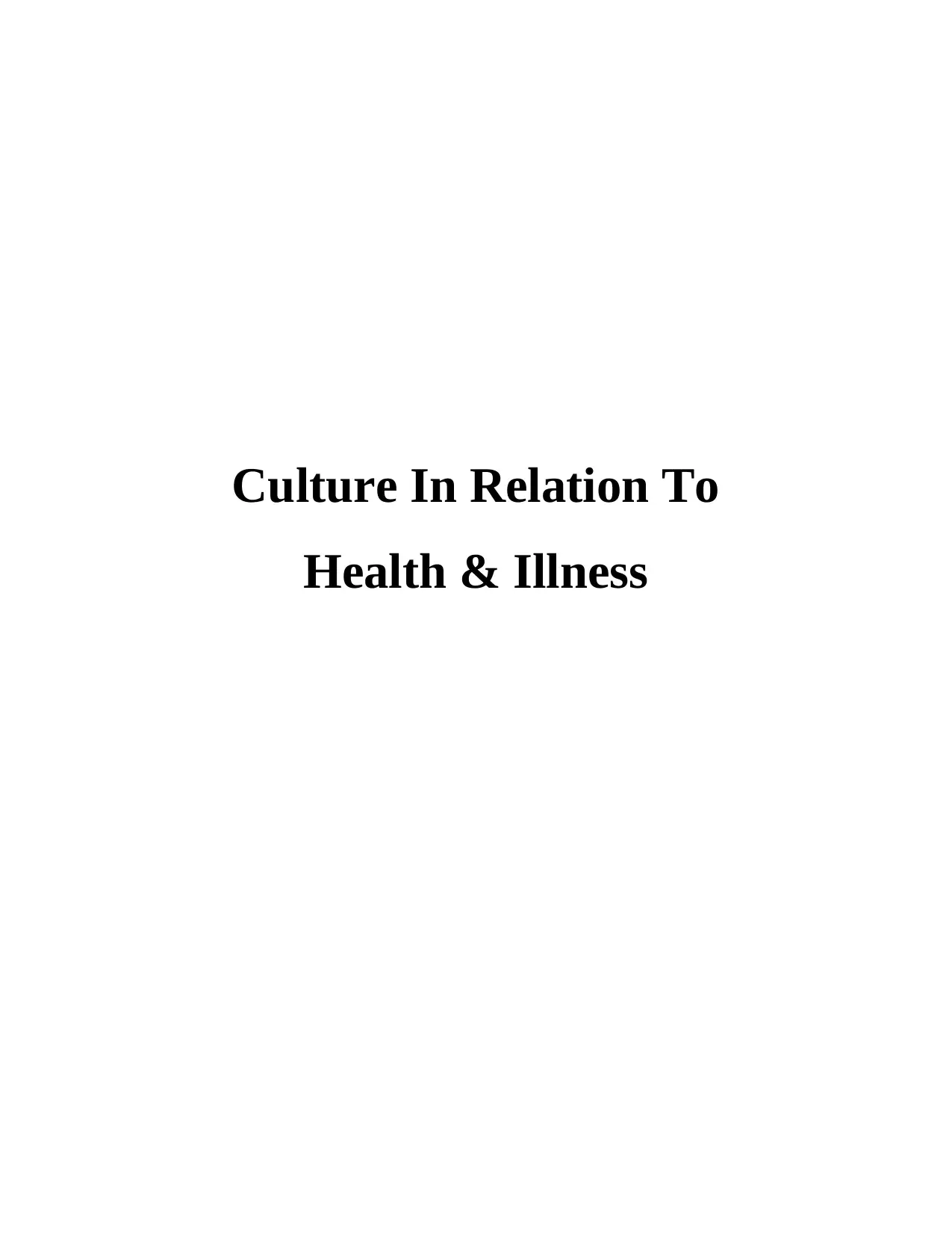
Culture In Relation To
Health & Illness
Health & Illness
Paraphrase This Document
Need a fresh take? Get an instant paraphrase of this document with our AI Paraphraser
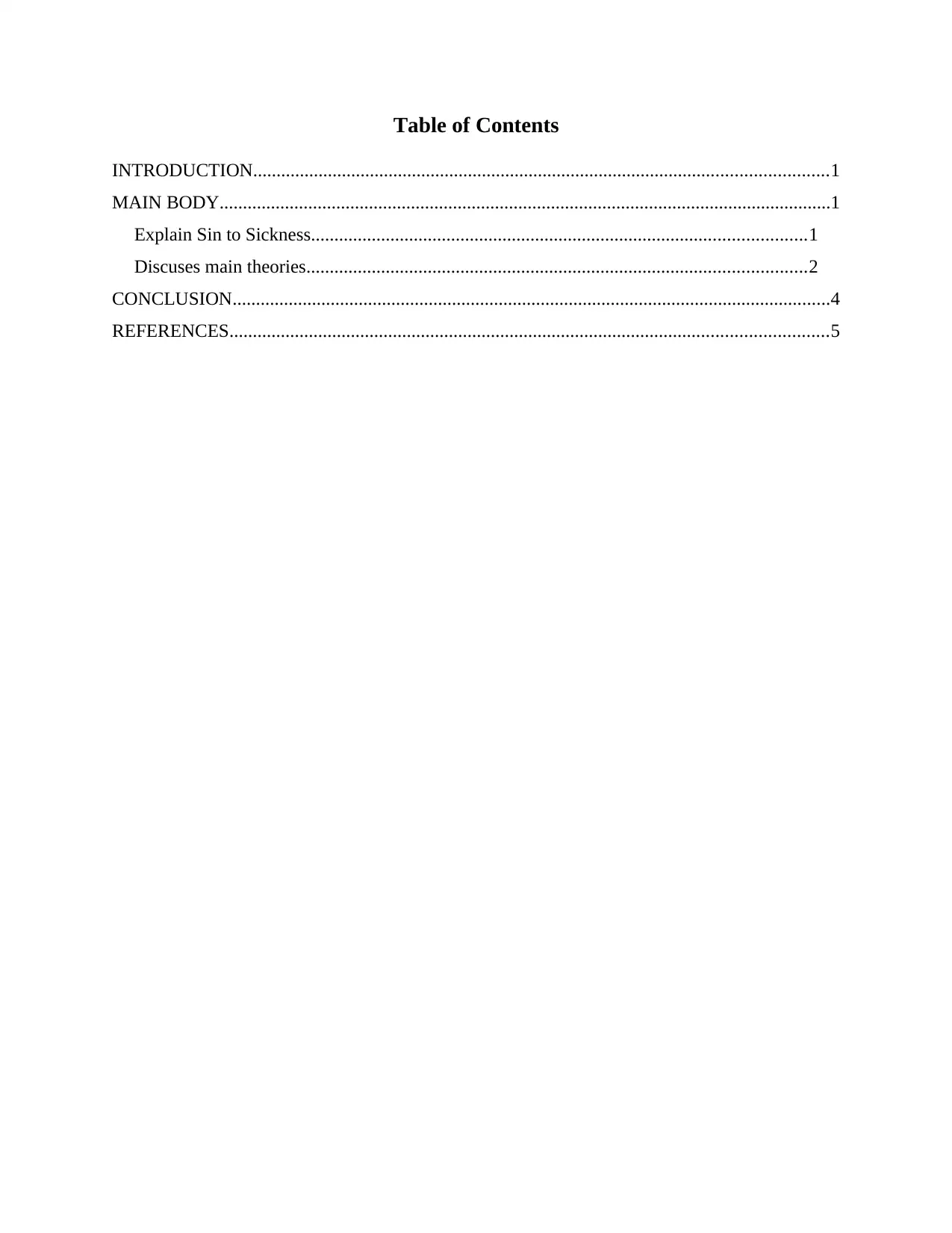
Table of Contents
INTRODUCTION...........................................................................................................................1
MAIN BODY...................................................................................................................................1
Explain Sin to Sickness..........................................................................................................1
Discuses main theories...........................................................................................................2
CONCLUSION................................................................................................................................4
REFERENCES................................................................................................................................5
INTRODUCTION...........................................................................................................................1
MAIN BODY...................................................................................................................................1
Explain Sin to Sickness..........................................................................................................1
Discuses main theories...........................................................................................................2
CONCLUSION................................................................................................................................4
REFERENCES................................................................................................................................5

⊘ This is a preview!⊘
Do you want full access?
Subscribe today to unlock all pages.

Trusted by 1+ million students worldwide
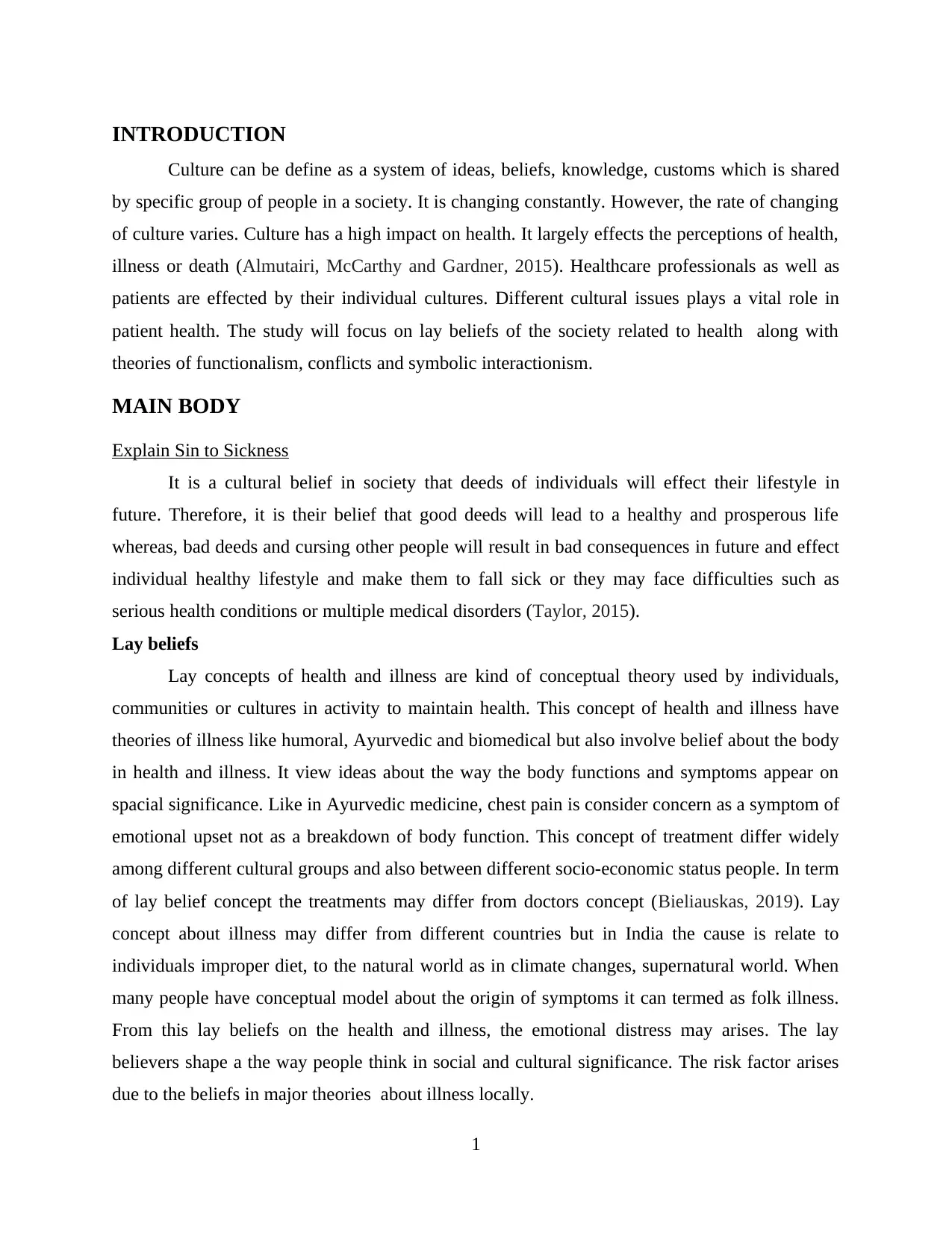
INTRODUCTION
Culture can be define as a system of ideas, beliefs, knowledge, customs which is shared
by specific group of people in a society. It is changing constantly. However, the rate of changing
of culture varies. Culture has a high impact on health. It largely effects the perceptions of health,
illness or death (Almutairi, McCarthy and Gardner, 2015). Healthcare professionals as well as
patients are effected by their individual cultures. Different cultural issues plays a vital role in
patient health. The study will focus on lay beliefs of the society related to health along with
theories of functionalism, conflicts and symbolic interactionism.
MAIN BODY
Explain Sin to Sickness
It is a cultural belief in society that deeds of individuals will effect their lifestyle in
future. Therefore, it is their belief that good deeds will lead to a healthy and prosperous life
whereas, bad deeds and cursing other people will result in bad consequences in future and effect
individual healthy lifestyle and make them to fall sick or they may face difficulties such as
serious health conditions or multiple medical disorders (Taylor, 2015).
Lay beliefs
Lay concepts of health and illness are kind of conceptual theory used by individuals,
communities or cultures in activity to maintain health. This concept of health and illness have
theories of illness like humoral, Ayurvedic and biomedical but also involve belief about the body
in health and illness. It view ideas about the way the body functions and symptoms appear on
spacial significance. Like in Ayurvedic medicine, chest pain is consider concern as a symptom of
emotional upset not as a breakdown of body function. This concept of treatment differ widely
among different cultural groups and also between different socio-economic status people. In term
of lay belief concept the treatments may differ from doctors concept (Bieliauskas, 2019). Lay
concept about illness may differ from different countries but in India the cause is relate to
individuals improper diet, to the natural world as in climate changes, supernatural world. When
many people have conceptual model about the origin of symptoms it can termed as folk illness.
From this lay beliefs on the health and illness, the emotional distress may arises. The lay
believers shape a the way people think in social and cultural significance. The risk factor arises
due to the beliefs in major theories about illness locally.
1
Culture can be define as a system of ideas, beliefs, knowledge, customs which is shared
by specific group of people in a society. It is changing constantly. However, the rate of changing
of culture varies. Culture has a high impact on health. It largely effects the perceptions of health,
illness or death (Almutairi, McCarthy and Gardner, 2015). Healthcare professionals as well as
patients are effected by their individual cultures. Different cultural issues plays a vital role in
patient health. The study will focus on lay beliefs of the society related to health along with
theories of functionalism, conflicts and symbolic interactionism.
MAIN BODY
Explain Sin to Sickness
It is a cultural belief in society that deeds of individuals will effect their lifestyle in
future. Therefore, it is their belief that good deeds will lead to a healthy and prosperous life
whereas, bad deeds and cursing other people will result in bad consequences in future and effect
individual healthy lifestyle and make them to fall sick or they may face difficulties such as
serious health conditions or multiple medical disorders (Taylor, 2015).
Lay beliefs
Lay concepts of health and illness are kind of conceptual theory used by individuals,
communities or cultures in activity to maintain health. This concept of health and illness have
theories of illness like humoral, Ayurvedic and biomedical but also involve belief about the body
in health and illness. It view ideas about the way the body functions and symptoms appear on
spacial significance. Like in Ayurvedic medicine, chest pain is consider concern as a symptom of
emotional upset not as a breakdown of body function. This concept of treatment differ widely
among different cultural groups and also between different socio-economic status people. In term
of lay belief concept the treatments may differ from doctors concept (Bieliauskas, 2019). Lay
concept about illness may differ from different countries but in India the cause is relate to
individuals improper diet, to the natural world as in climate changes, supernatural world. When
many people have conceptual model about the origin of symptoms it can termed as folk illness.
From this lay beliefs on the health and illness, the emotional distress may arises. The lay
believers shape a the way people think in social and cultural significance. The risk factor arises
due to the beliefs in major theories about illness locally.
1
Paraphrase This Document
Need a fresh take? Get an instant paraphrase of this document with our AI Paraphraser
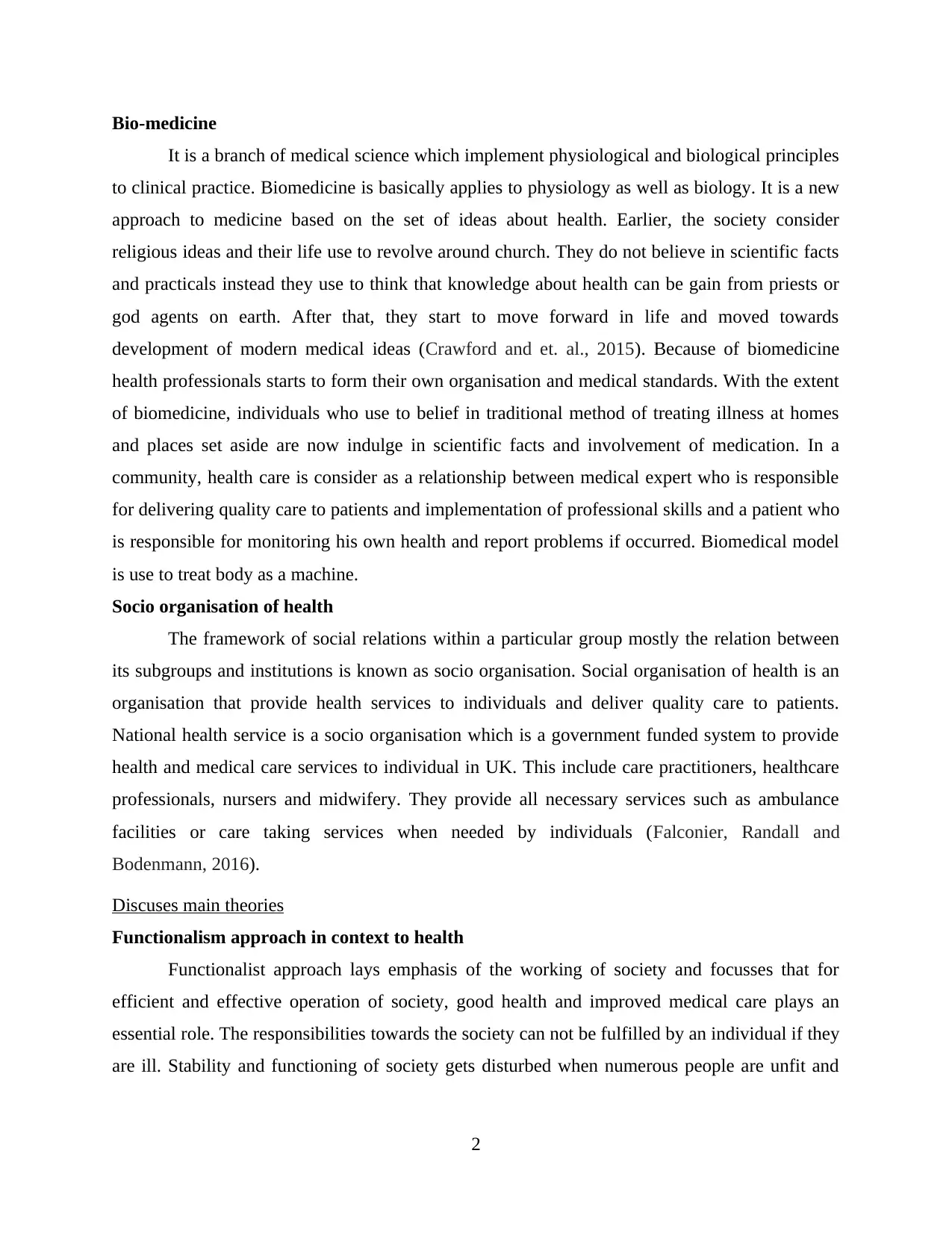
Bio-medicine
It is a branch of medical science which implement physiological and biological principles
to clinical practice. Biomedicine is basically applies to physiology as well as biology. It is a new
approach to medicine based on the set of ideas about health. Earlier, the society consider
religious ideas and their life use to revolve around church. They do not believe in scientific facts
and practicals instead they use to think that knowledge about health can be gain from priests or
god agents on earth. After that, they start to move forward in life and moved towards
development of modern medical ideas (Crawford and et. al., 2015). Because of biomedicine
health professionals starts to form their own organisation and medical standards. With the extent
of biomedicine, individuals who use to belief in traditional method of treating illness at homes
and places set aside are now indulge in scientific facts and involvement of medication. In a
community, health care is consider as a relationship between medical expert who is responsible
for delivering quality care to patients and implementation of professional skills and a patient who
is responsible for monitoring his own health and report problems if occurred. Biomedical model
is use to treat body as a machine.
Socio organisation of health
The framework of social relations within a particular group mostly the relation between
its subgroups and institutions is known as socio organisation. Social organisation of health is an
organisation that provide health services to individuals and deliver quality care to patients.
National health service is a socio organisation which is a government funded system to provide
health and medical care services to individual in UK. This include care practitioners, healthcare
professionals, nursers and midwifery. They provide all necessary services such as ambulance
facilities or care taking services when needed by individuals (Falconier, Randall and
Bodenmann, 2016).
Discuses main theories
Functionalism approach in context to health
Functionalist approach lays emphasis of the working of society and focusses that for
efficient and effective operation of society, good health and improved medical care plays an
essential role. The responsibilities towards the society can not be fulfilled by an individual if they
are ill. Stability and functioning of society gets disturbed when numerous people are unfit and
2
It is a branch of medical science which implement physiological and biological principles
to clinical practice. Biomedicine is basically applies to physiology as well as biology. It is a new
approach to medicine based on the set of ideas about health. Earlier, the society consider
religious ideas and their life use to revolve around church. They do not believe in scientific facts
and practicals instead they use to think that knowledge about health can be gain from priests or
god agents on earth. After that, they start to move forward in life and moved towards
development of modern medical ideas (Crawford and et. al., 2015). Because of biomedicine
health professionals starts to form their own organisation and medical standards. With the extent
of biomedicine, individuals who use to belief in traditional method of treating illness at homes
and places set aside are now indulge in scientific facts and involvement of medication. In a
community, health care is consider as a relationship between medical expert who is responsible
for delivering quality care to patients and implementation of professional skills and a patient who
is responsible for monitoring his own health and report problems if occurred. Biomedical model
is use to treat body as a machine.
Socio organisation of health
The framework of social relations within a particular group mostly the relation between
its subgroups and institutions is known as socio organisation. Social organisation of health is an
organisation that provide health services to individuals and deliver quality care to patients.
National health service is a socio organisation which is a government funded system to provide
health and medical care services to individual in UK. This include care practitioners, healthcare
professionals, nursers and midwifery. They provide all necessary services such as ambulance
facilities or care taking services when needed by individuals (Falconier, Randall and
Bodenmann, 2016).
Discuses main theories
Functionalism approach in context to health
Functionalist approach lays emphasis of the working of society and focusses that for
efficient and effective operation of society, good health and improved medical care plays an
essential role. The responsibilities towards the society can not be fulfilled by an individual if they
are ill. Stability and functioning of society gets disturbed when numerous people are unfit and
2
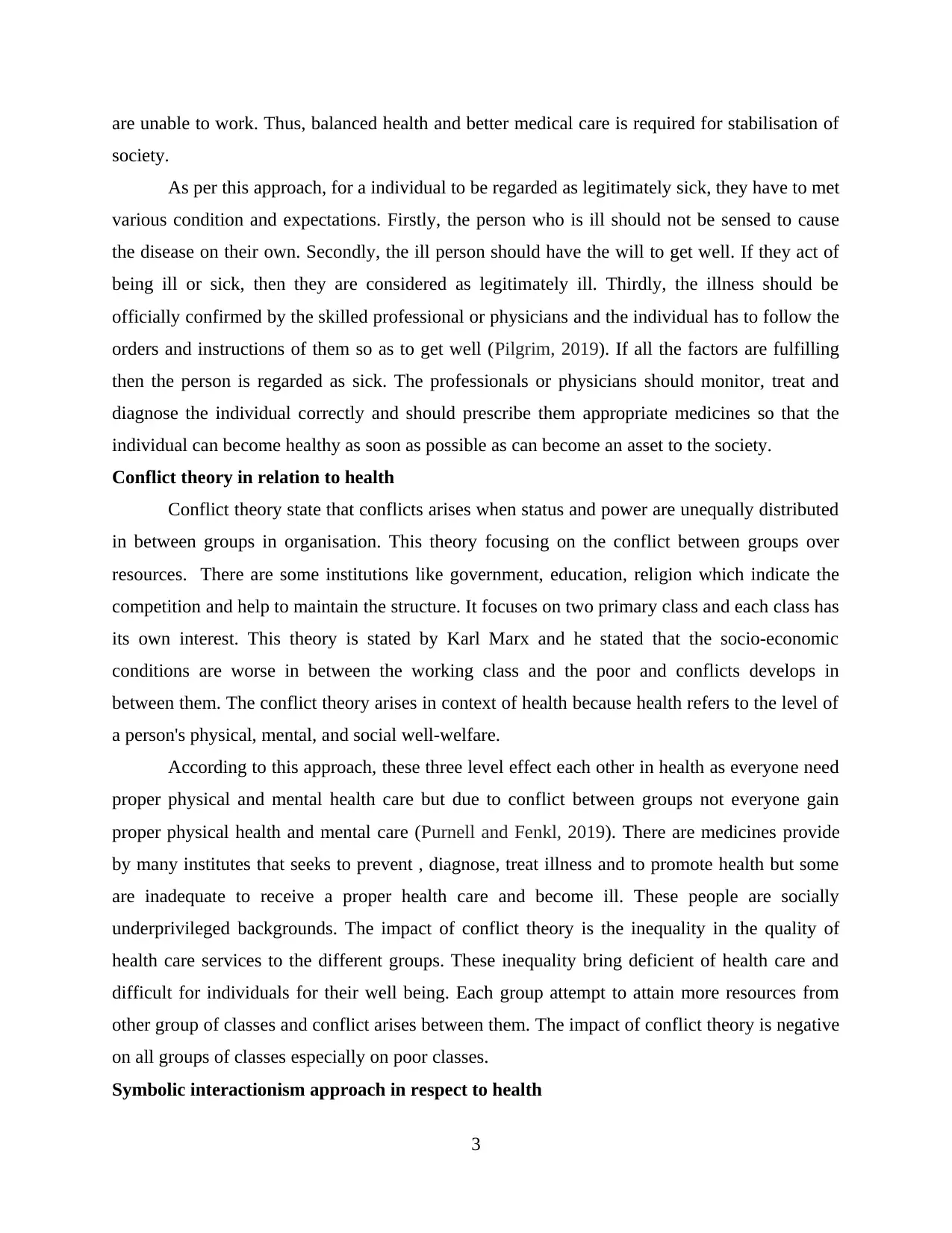
are unable to work. Thus, balanced health and better medical care is required for stabilisation of
society.
As per this approach, for a individual to be regarded as legitimately sick, they have to met
various condition and expectations. Firstly, the person who is ill should not be sensed to cause
the disease on their own. Secondly, the ill person should have the will to get well. If they act of
being ill or sick, then they are considered as legitimately ill. Thirdly, the illness should be
officially confirmed by the skilled professional or physicians and the individual has to follow the
orders and instructions of them so as to get well (Pilgrim, 2019). If all the factors are fulfilling
then the person is regarded as sick. The professionals or physicians should monitor, treat and
diagnose the individual correctly and should prescribe them appropriate medicines so that the
individual can become healthy as soon as possible as can become an asset to the society.
Conflict theory in relation to health
Conflict theory state that conflicts arises when status and power are unequally distributed
in between groups in organisation. This theory focusing on the conflict between groups over
resources. There are some institutions like government, education, religion which indicate the
competition and help to maintain the structure. It focuses on two primary class and each class has
its own interest. This theory is stated by Karl Marx and he stated that the socio-economic
conditions are worse in between the working class and the poor and conflicts develops in
between them. The conflict theory arises in context of health because health refers to the level of
a person's physical, mental, and social well-welfare.
According to this approach, these three level effect each other in health as everyone need
proper physical and mental health care but due to conflict between groups not everyone gain
proper physical health and mental care (Purnell and Fenkl, 2019). There are medicines provide
by many institutes that seeks to prevent , diagnose, treat illness and to promote health but some
are inadequate to receive a proper health care and become ill. These people are socially
underprivileged backgrounds. The impact of conflict theory is the inequality in the quality of
health care services to the different groups. These inequality bring deficient of health care and
difficult for individuals for their well being. Each group attempt to attain more resources from
other group of classes and conflict arises between them. The impact of conflict theory is negative
on all groups of classes especially on poor classes.
Symbolic interactionism approach in respect to health
3
society.
As per this approach, for a individual to be regarded as legitimately sick, they have to met
various condition and expectations. Firstly, the person who is ill should not be sensed to cause
the disease on their own. Secondly, the ill person should have the will to get well. If they act of
being ill or sick, then they are considered as legitimately ill. Thirdly, the illness should be
officially confirmed by the skilled professional or physicians and the individual has to follow the
orders and instructions of them so as to get well (Pilgrim, 2019). If all the factors are fulfilling
then the person is regarded as sick. The professionals or physicians should monitor, treat and
diagnose the individual correctly and should prescribe them appropriate medicines so that the
individual can become healthy as soon as possible as can become an asset to the society.
Conflict theory in relation to health
Conflict theory state that conflicts arises when status and power are unequally distributed
in between groups in organisation. This theory focusing on the conflict between groups over
resources. There are some institutions like government, education, religion which indicate the
competition and help to maintain the structure. It focuses on two primary class and each class has
its own interest. This theory is stated by Karl Marx and he stated that the socio-economic
conditions are worse in between the working class and the poor and conflicts develops in
between them. The conflict theory arises in context of health because health refers to the level of
a person's physical, mental, and social well-welfare.
According to this approach, these three level effect each other in health as everyone need
proper physical and mental health care but due to conflict between groups not everyone gain
proper physical health and mental care (Purnell and Fenkl, 2019). There are medicines provide
by many institutes that seeks to prevent , diagnose, treat illness and to promote health but some
are inadequate to receive a proper health care and become ill. These people are socially
underprivileged backgrounds. The impact of conflict theory is the inequality in the quality of
health care services to the different groups. These inequality bring deficient of health care and
difficult for individuals for their well being. Each group attempt to attain more resources from
other group of classes and conflict arises between them. The impact of conflict theory is negative
on all groups of classes especially on poor classes.
Symbolic interactionism approach in respect to health
3
⊘ This is a preview!⊘
Do you want full access?
Subscribe today to unlock all pages.

Trusted by 1+ million students worldwide
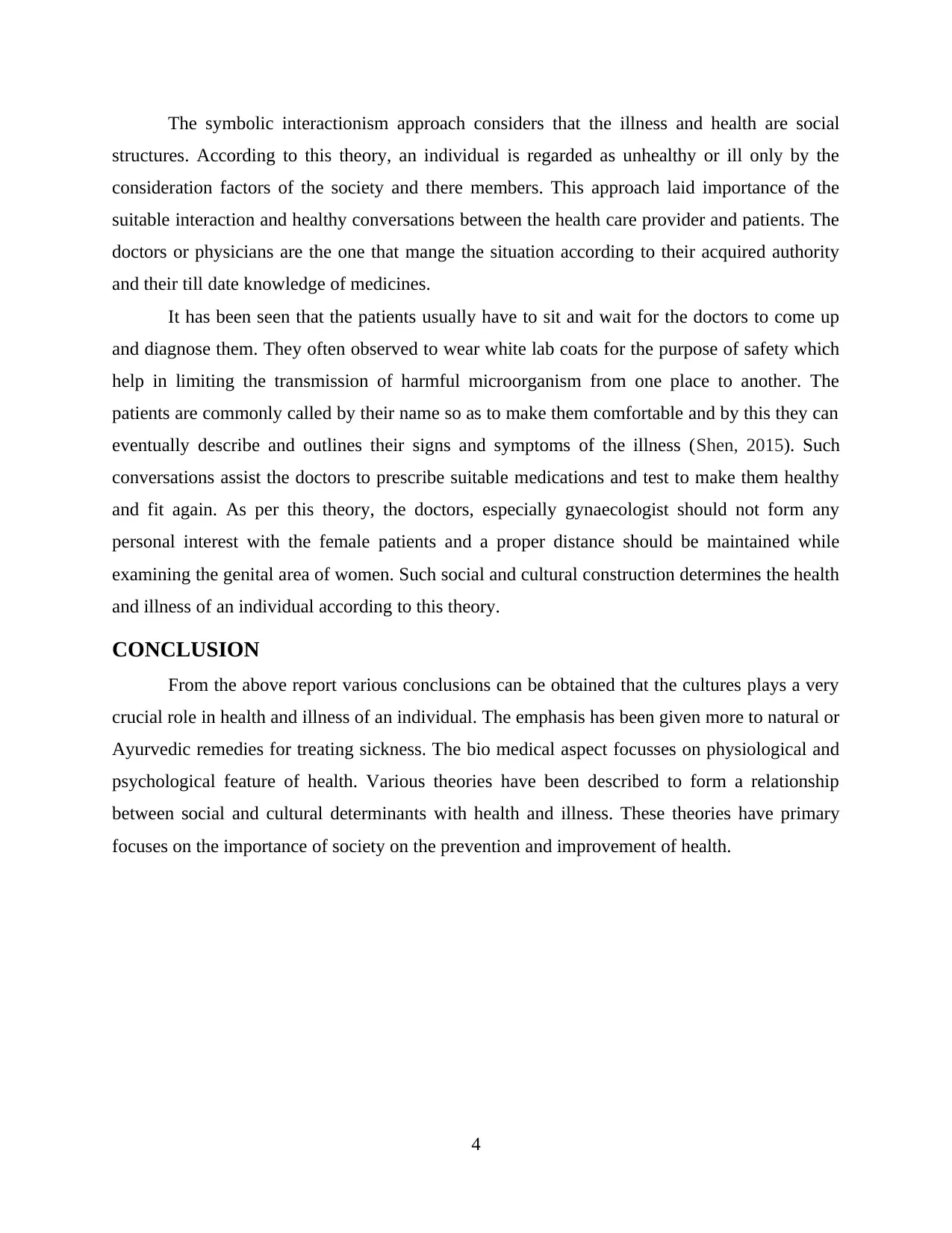
The symbolic interactionism approach considers that the illness and health are social
structures. According to this theory, an individual is regarded as unhealthy or ill only by the
consideration factors of the society and there members. This approach laid importance of the
suitable interaction and healthy conversations between the health care provider and patients. The
doctors or physicians are the one that mange the situation according to their acquired authority
and their till date knowledge of medicines.
It has been seen that the patients usually have to sit and wait for the doctors to come up
and diagnose them. They often observed to wear white lab coats for the purpose of safety which
help in limiting the transmission of harmful microorganism from one place to another. The
patients are commonly called by their name so as to make them comfortable and by this they can
eventually describe and outlines their signs and symptoms of the illness (Shen, 2015). Such
conversations assist the doctors to prescribe suitable medications and test to make them healthy
and fit again. As per this theory, the doctors, especially gynaecologist should not form any
personal interest with the female patients and a proper distance should be maintained while
examining the genital area of women. Such social and cultural construction determines the health
and illness of an individual according to this theory.
CONCLUSION
From the above report various conclusions can be obtained that the cultures plays a very
crucial role in health and illness of an individual. The emphasis has been given more to natural or
Ayurvedic remedies for treating sickness. The bio medical aspect focusses on physiological and
psychological feature of health. Various theories have been described to form a relationship
between social and cultural determinants with health and illness. These theories have primary
focuses on the importance of society on the prevention and improvement of health.
4
structures. According to this theory, an individual is regarded as unhealthy or ill only by the
consideration factors of the society and there members. This approach laid importance of the
suitable interaction and healthy conversations between the health care provider and patients. The
doctors or physicians are the one that mange the situation according to their acquired authority
and their till date knowledge of medicines.
It has been seen that the patients usually have to sit and wait for the doctors to come up
and diagnose them. They often observed to wear white lab coats for the purpose of safety which
help in limiting the transmission of harmful microorganism from one place to another. The
patients are commonly called by their name so as to make them comfortable and by this they can
eventually describe and outlines their signs and symptoms of the illness (Shen, 2015). Such
conversations assist the doctors to prescribe suitable medications and test to make them healthy
and fit again. As per this theory, the doctors, especially gynaecologist should not form any
personal interest with the female patients and a proper distance should be maintained while
examining the genital area of women. Such social and cultural construction determines the health
and illness of an individual according to this theory.
CONCLUSION
From the above report various conclusions can be obtained that the cultures plays a very
crucial role in health and illness of an individual. The emphasis has been given more to natural or
Ayurvedic remedies for treating sickness. The bio medical aspect focusses on physiological and
psychological feature of health. Various theories have been described to form a relationship
between social and cultural determinants with health and illness. These theories have primary
focuses on the importance of society on the prevention and improvement of health.
4
Paraphrase This Document
Need a fresh take? Get an instant paraphrase of this document with our AI Paraphraser
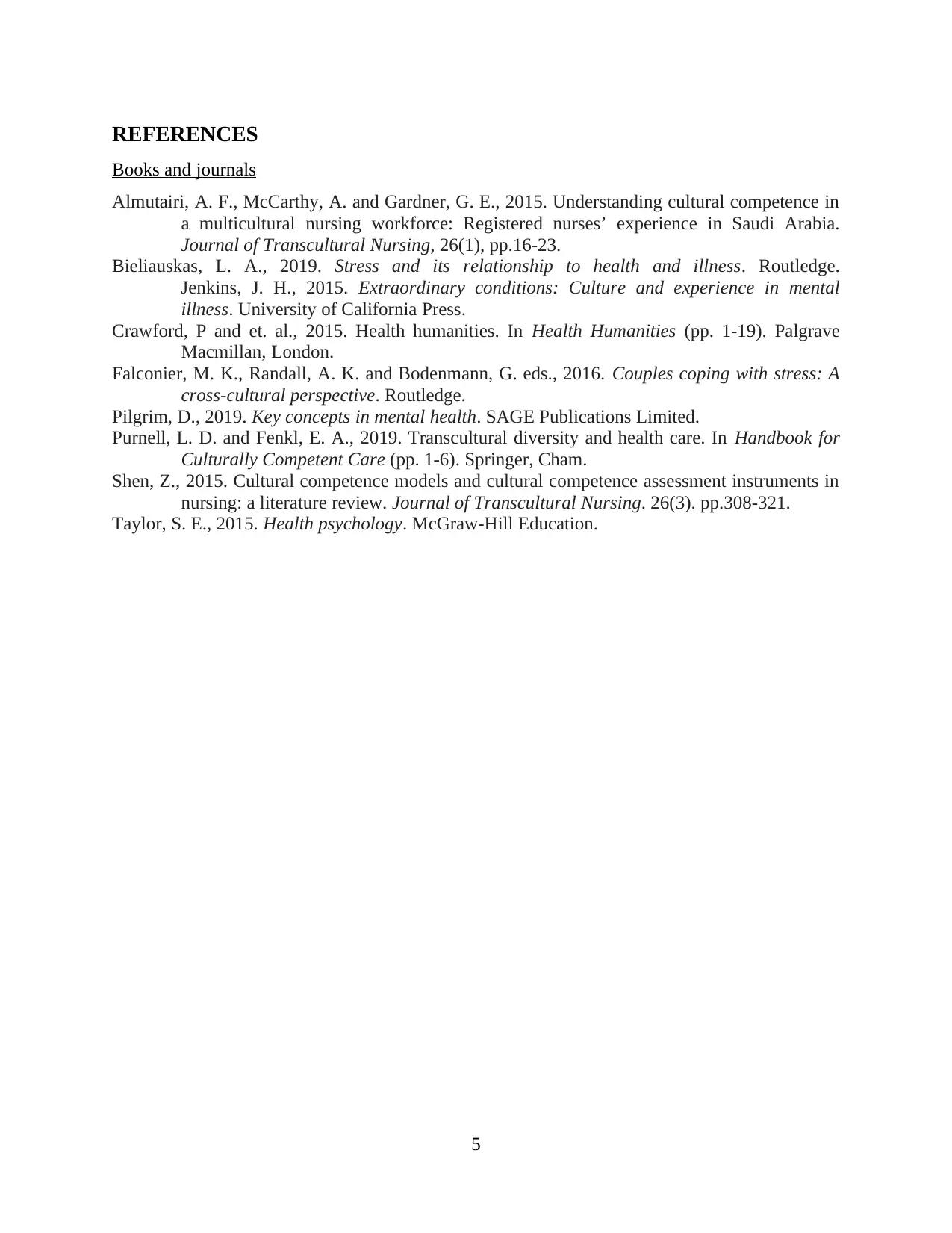
REFERENCES
Books and journals
Almutairi, A. F., McCarthy, A. and Gardner, G. E., 2015. Understanding cultural competence in
a multicultural nursing workforce: Registered nurses’ experience in Saudi Arabia.
Journal of Transcultural Nursing, 26(1), pp.16-23.
Bieliauskas, L. A., 2019. Stress and its relationship to health and illness. Routledge.
Jenkins, J. H., 2015. Extraordinary conditions: Culture and experience in mental
illness. University of California Press.
Crawford, P and et. al., 2015. Health humanities. In Health Humanities (pp. 1-19). Palgrave
Macmillan, London.
Falconier, M. K., Randall, A. K. and Bodenmann, G. eds., 2016. Couples coping with stress: A
cross-cultural perspective. Routledge.
Pilgrim, D., 2019. Key concepts in mental health. SAGE Publications Limited.
Purnell, L. D. and Fenkl, E. A., 2019. Transcultural diversity and health care. In Handbook for
Culturally Competent Care (pp. 1-6). Springer, Cham.
Shen, Z., 2015. Cultural competence models and cultural competence assessment instruments in
nursing: a literature review. Journal of Transcultural Nursing. 26(3). pp.308-321.
Taylor, S. E., 2015. Health psychology. McGraw-Hill Education.
5
Books and journals
Almutairi, A. F., McCarthy, A. and Gardner, G. E., 2015. Understanding cultural competence in
a multicultural nursing workforce: Registered nurses’ experience in Saudi Arabia.
Journal of Transcultural Nursing, 26(1), pp.16-23.
Bieliauskas, L. A., 2019. Stress and its relationship to health and illness. Routledge.
Jenkins, J. H., 2015. Extraordinary conditions: Culture and experience in mental
illness. University of California Press.
Crawford, P and et. al., 2015. Health humanities. In Health Humanities (pp. 1-19). Palgrave
Macmillan, London.
Falconier, M. K., Randall, A. K. and Bodenmann, G. eds., 2016. Couples coping with stress: A
cross-cultural perspective. Routledge.
Pilgrim, D., 2019. Key concepts in mental health. SAGE Publications Limited.
Purnell, L. D. and Fenkl, E. A., 2019. Transcultural diversity and health care. In Handbook for
Culturally Competent Care (pp. 1-6). Springer, Cham.
Shen, Z., 2015. Cultural competence models and cultural competence assessment instruments in
nursing: a literature review. Journal of Transcultural Nursing. 26(3). pp.308-321.
Taylor, S. E., 2015. Health psychology. McGraw-Hill Education.
5
1 out of 8
Related Documents
Your All-in-One AI-Powered Toolkit for Academic Success.
+13062052269
info@desklib.com
Available 24*7 on WhatsApp / Email
![[object Object]](/_next/static/media/star-bottom.7253800d.svg)
Unlock your academic potential
Copyright © 2020–2026 A2Z Services. All Rights Reserved. Developed and managed by ZUCOL.





